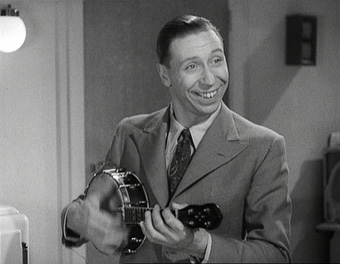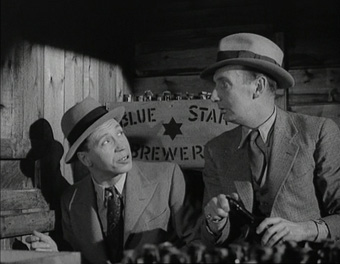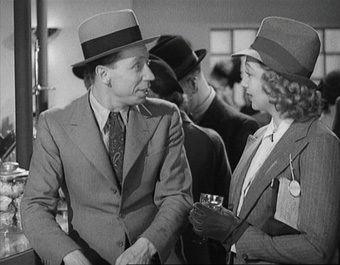|
"Turned out nice again!"
My local branch of Wetherspoons, in a clumsy attempt to integrate itself into the local landscape, hangs pictures on the walls depicting people and events relevant to the history of the local area. So while necking pints of budget lager, you can marvel at the ingenuity of the early Roman settlers, reflect on the misery of the triangle slave trade, or contemplate the life of local boy Sir Richard Owen. The laziness of the exercise is highlighted by the inclusion of miniature biographies of Gracie Fields and George Formby, under the inferred banner of famous Lancastrians. They are two names that surmise the bawdy, northern vaudeville that was taken on tour to entertain our boys in the war and the rest of the country in cheery working class comedies like Off the Dole and Look Up and Laugh. For a pair that was so famous in their day – the two biggest stars of the decade, according to their box office receipts – they are not held in any particularly favourable critical light today. This then, is my first Formby experience, and a chance to see what all the fuss was about.

When you first see Formby in Trouble Brewing, he's working on a printer's shop floor. An angry foreman is shouting about some dirty marks that have appeared on the latest run, and demands to know the culprit. George's friend Bill Pike (Gus McConaught) then says 'You'd better ask George Gullip – he thinks he's Sexton Blake and Sherlock Holmes all rolled into one.' The foreman summons Gullip, and it's at that moment we get our first look at him. He turns round with a start, drops the bit of machinery he was fixing and squeals 'Yes sir?' in his nasally Wigan accent. He then slides, one leg on each banister, down the stairs – a stunt he repeats in the film's climactic scene. It's a funny moment, but what immediately strikes about George is the plain weirdness of his appearance. His sunken goggle eyes, the oddly long, crooked teeth, a non-existent chin, the Roman nose, slicked back hair – he's a physical caricature of himself, like a Picasso sculpture leering through a Gym window.
The performance throughout the film is more than enough to match the peculiarity. He doesn't walk so much as waddle, gradually building speed as he does so as if carried by his own momentum, and he acts like the ground beneath him is unstable. He's got a kind of dithery presence and a good line in physical comedy; spinning round in circles, bumping into things and falling over furniture – just navigating the set is fraught with dangers for Formby that other characters don't mind. He stands with his shoulders hunched, neck forward, teeth protruding gormlessly. The ill-fitting suit he's packed into, with tie tucked into trousers, and the comical pork pie hat that's unceremoniously plonked on his head heightens Formby's unnatural presence. When people ask him a question he becomes incredibly shy, twisting his neck about and giggling nervously – in normal speech he stammers and speaks over himself, and characters are always interrupting him and cutting him off. He acts as if he's a couple of seconds behind the other characters, always reacting rather than acting. In fact, George is always being pushed around by other characters – people slam doors on him, physically manoeuvre him around the set, force him into difficult situations, all the while talking over his protestations – effectively augmenting Formby's mannered clumsy awkwardness. His interactions with his accomplice Bill Pike take on a particularly disturbing quality – as the two track down a criminal gang they get into various skits of physical comedy, and Pike begins to eerily represent something like Formby's pimp; bullying him about, coercing him into doing various unpleasant tasks for him and generally throwing his weight around. On the other end of the spectrum there's a slackly developed romantic sub-plot with secretary Mary Brown, played with admirable enthusiasm by Googie Whithers, in which Formby comes across as a bashful imbecilic child. The film's most discontinuous scene has Formby belting out a cheeky song to a female maid and cook in an upper-class house; at the end of which he departs, with both women sighing helplessly and the maid dreamily intoning 'ooh I think he's beautiful', the cook nodding in agreement. The whole act – whilst occasionally funny and oddly likeable – is more alien than anything else. Formby appears as if he isn't comfortable, physically or verbally, with any part of himself.

If the act seems peculiar and out of place, this evidently wasn't how contemporary audience saw him – as his vast popularity will attest – and this is reflected in the construction of the film. The piece is carpentered entirely around him. The plot is a simple comic crime story that sees George winning big at the races and being conned out of his money by a gang of counterfeiters, whom he spends the rest of the film pursuing – doing battle with various stuffy southern types along the way. The story is a kind of spine on which various comic skits are hung – so George gets accidentally forced into a wrestling match, has to retrieve a bit of paper from a lady's stocking at a party, and rob a police chief's flat in the middle of the night. Along the way various Formby tunes are crowbarred in, often with unapologetic ham-fistidness (in one lively pub sing-along one of the punters helpfully walks past with a ukulele which he donates to George). Formby gets to deliver all the signature catchphrases – 'turned out nice again' and 'ooh mother!' Watching the film begins to feel like watching a music hall revue, as sketch follows skit follows musical number. Theatricality is embedded into the visual layout of the picture: there is a reliance on mid and two shots, stagey compositions with minimal editing and camera movement. Most of the scenes feature two characters standing right next each other in the style of a vaudeville double act, complete with requisite nudges, winks and cuff tapping. In the climactic sequence at the Blue Star Brewery this does change and the dreary pace picks up as George and Bill engage in several frantic set pieces, including a shoot-out where bottles of Newcastle Brown replace guns and a series of foot chases through the brewery. All of which makes use of a livelier aesthetic and multiple planes of action – but by this point it's unfortunately a case of too little to late. Most of the film drags along as if someone has taken Formby's end of pier act and used it to conjure up a film – a film that is procedural, episodic, and unfortunately a little boring.
Another shining restoration from Studio Canal getting a UK DVD release from Optimum, the picture quality again belies the film's vintage, boasting strong contrast, solid black levels and impressive sharpness, while there's barely a hint of the frame jitter we used to take for granted on films of this age. Dust spots are also rare. A very nice transfer.

The sound inevitably shows its age more readily, particularly in the narrow contrast range and music that sounds a little like its being played on a 78rpm record. There are hints of pops and crackle in the background, but they've been effectively pushed back. Generally this is as good as you could expect teh film to sound after all this time.
None.
This is a hard film to recommend, except to Formby fans. His act is bizarre, charming in a way, but the film's contrived composition both in plot and aesthetic terms render it a plodding, listless experience. This isn't a film so much as a variety show, and one that isn't particularly entertaining in any case.
|